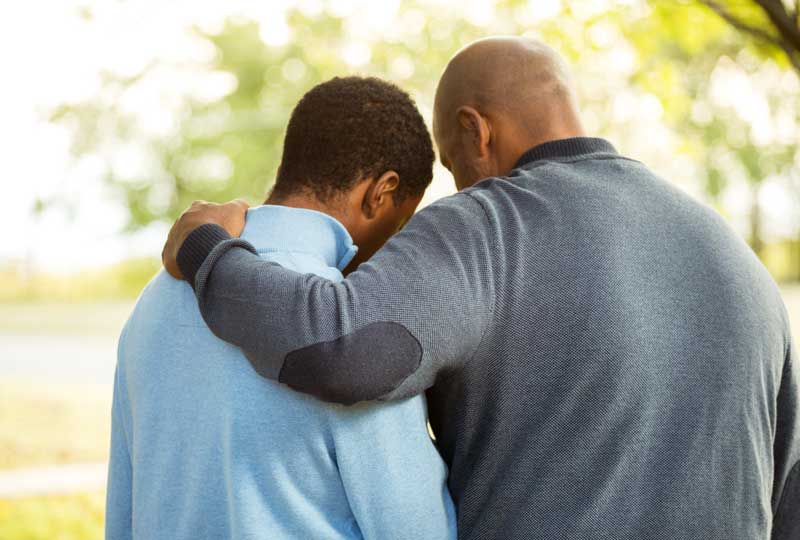Having conversations about your child’s mental health helps keep them safe.
Over the course of the pandemic, emergency department visits for suspected suicide attempts among teens have been on the rise in the United States. But even before COVID-19, the nation had been seeing a steady increase in suicide rates among teens and young adults for about a decade. An increase in these rates can understandably leave you concerned about your children. Health care experts say that talking to your kids about mental health issues and suicide is a good idea. And if your child is facing a mental health crisis, there are immediate steps you can take to keep them safe.
Talking about issues opens the door for children to confide. And bringing up the topic of suicide isn’t harmful, said Alex Bettis, PhD, a clinical psychologist with Vanderbilt Child and Adolescent Psychiatry. “If a child has never had suicidal thoughts and a parent were to ask if they’ve ever had those types of thoughts,” Bettis explained, “the simple act of asking is not going to make a child suddenly start having those thoughts.”
Talking to children about mental health is helpful
For many parents, the importance of mental health may not have been a topic of family conversation while they were growing up. And for that reason, discussions with their own children about depression, anxiety or suicide can be frightening at first, Bettis said.
Opening up conversations about your child’s mental health, however, sends the message to kids that their home is a safe space and their parents are safe people to come to if they are experiencing mental health difficulties. Providing validation and support to your child during these difficult conversations is important. Letting your child know that you hear them and that you want to help them is a helpful first step.
“I think showing your child that you care about their mental health just as much as you care about the other pieces of their lives can be a really powerful way to make it OK for kids to share when they are struggling,” Bettis explained.
“Showing your child that you care about their mental health just as much as you care about the other pieces of their lives can be a really powerful way to make it OK for kids to share when they are struggling.”
How do you know if your child is struggling with their mental health?
“Some things to pay attention to are any changes in your child that seem out of character for them,” Bettis said. Maybe your child is very social, for example, but they suddenly stop spending time with friends, or maybe they seem sad or down for a prolonged period. These are signs that they could be experiencing mental health problems.
Also pay attention to when your child experiences a letdown or setback. “Remember that things that may seem relatively small to you as a parent may be really stressful to teenagers,” Bettis said, “and these stressful experiences can precipitate mental health crises.” Such events might include a breakup, not making a sports team, an argument with a close friend or struggling in school.
How do you know if your child is having suicidal thoughts?
“While children and teens may experience suicidal thoughts for many different reasons, we know that life stress in general and stress related to interpersonal relationships seem to be particularly important to pay attention to,” Bettis said. “We also know that social isolation and negative social experiences, like being a victim of bullying, are related to suicidal thoughts in teens. So when kids start to isolate, or for kids who are already isolated, we definitely want to be paying attention and checking in with them,” she added.
If you notice any warning signs of teen suicide when your child is undergoing a stressful situation, Bettis said to have a conversation about their mental health and whether they are having thoughts of suicide or self-harm.
“We know that kids aren’t necessarily going to be coming forward when they have these thoughts and sharing them unprompted,” she explains. “So checking in and asking direct questions about it is really going to be the best way to find out what’s going on with your teen.”
What should you do in a crisis?
If your child is experiencing mental health difficulties, including suicidal thoughts, and they already have a psychiatrist or psychologist, you can reach out to them for direction. If your child doesn’t already have a mental health care provider, Bettis said, it may be time to consider looking for one to make sure you and your child get support. Lastly, if your child is having thoughts of suicide or self-harm, and you are worried that you can’t keep them safe, you can take them to the emergency room to get a formal assessment.
Additionally, Bettis said one easy way to help keep your child safe is to keep their home environment safe. If your child is having active thoughts of suicide or self-harm, it can be helpful to restrict access to things in the home your child could use to try to end their life. At all times — independent of a crisis — it is recommended that firearms should be locked with ammunition stored separately if in the home. But during a time of crisis, parents should also consider safely storing things like medications (even over-the-counter medications like pain relievers), razor blades and knives so that their child can’t access them without supervision.
“We’re not saying that you can never have a kitchen knife in your home or never have Tylenol in the cabinet,” Bettis said. “But if there is a child in the home who is at risk in the moment, restricting access to these things over a short period of time while they’re getting the mental health support they need has been shown to be really effective at making sure that they stay safe.”

After-Hours care for your child
Vanderbilt’s Children’s After-Hours Clinics offer the convenience of a walk-in clinic with care provided by a board-certified pediatrician from Children’s Hospital. No appointment is necessary, but it’s wise to call your child’s pediatrician first.

